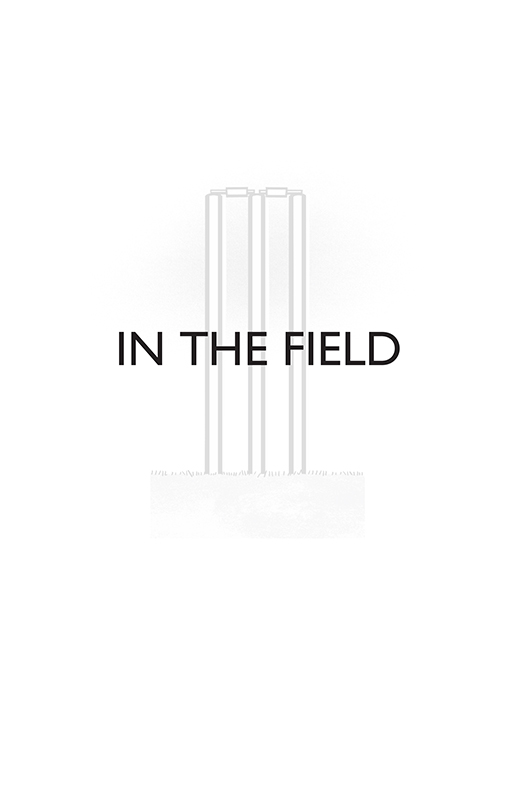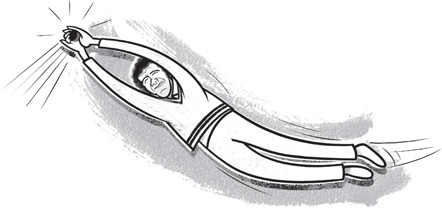

JOHN ARLOTT: Now, in comes Khan and bowls to him [Denis Compton] and he cracks that to back down to mid-off, but mid-off is – I was going to say respectfully deep … mid-off’s position is a women and children first position. They’re obviously about to take to the boats.
England v Pakistan, Trent Bridge, July 1954
• • •
JOHN ARLOTT: Fielders scattering like missionaries to far places.
Date unknown
• • •
JOHN ARLOTT: 77 they [New Zealand] now want with five wickets to fall, and Arnold bowls to Wadsworth … and he edges it and he’s magnificently caught! He is quite splendidly caught by Roope going far, far to his right at second slip, and let me say there are not more than three or four people in English cricket today who would have caught that. It must have been at least six feet wide of his right foot as he stood at second slip and he got across, took it two-handed. Bill Frindall reminds me that he’s a goalkeeper. He took it two-handed, goalkeeper fashion, away wide to his right, and Wadsworth is short of the 50 that would have come if that had been missed. Caught Roope, bowled Arnold, 46. 402 for 6 – and the game is now back in the hazard, as the tennis players say.
England v New Zealand, Trent Bridge, June 1973
• • •

JOHN ARLOTT: Massie bowls, Illingworth edges, and he’s caught by Stackpole at second slip. He [Stackpole] was one of those who had none of the booty until then.
England v Australia, Lord’s, June 1972
• • •
BRIAN JOHNSTON: Up comes Holder now, bowls this one outside the off stump, and it’s steered away on the off side. Nice bit of fielding by Julian there there might be overthrows here, and there are. They’ve taken one and they’re taking a second one. So three runs to Knott from a ball he steered from outside the off stump – and there’s going to be more! There’s going to be four overthrows added to that. So Knott has got seven. They’re trying to work out which end they’ve got to go to …
BILL FRINDALL: [Umpire] Spencer signalled six.
BJ: Spencer signalled six, which is extraordinary. But they’ve got to work out which end to go to. Knott should be at the other end if they ran seven. Dear chap, that’s right, you go up there. They’re arguing like mad and they’re both coming to the same end, but it must be right for Knott to go to the other end.
BF (incredulous): It’s one plus two plus four …
BJ: Both the umpires are consulting now. This is the best muddle – it’s marvellous. Oh, it’s lovely. Knott doesn’t know which end to come to. I can tell him, he should be at the other end and they’re leaving him at this end. [Umpire] Constant is talking to Knott … oh and ‘one short’ was called. That doesn’t make a difference to which end they go … Knott’s going down the other end now and Spencer’s talking to Greig. This is absolutely splendid, isn’t it? Both the umpires are consulting, the two batsmen are there, everyone is in a state of flummox. Lloyd is getting in on the act. But … if it’s seven runs, then Knott must be at the other end.
BF: Even if it’s six and one short.
BJ: We’re trying to work out if it is one short but all these signals … now he’s signalling byes! Well, that can’t be right … two short is he signalling? …
BF: He’s signalling five plus two … I think he’s signalling seven.
BJ: Well, Knott has gone to 41 on the board so they’ve given him nine, haven’t they? No, he was 34. That’s right, they’ve given him seven. That was absolutely splendid. One of the best things I’ve seen in Test cricket.
England v West Indies, Headingley, July 1976
• • •
JOHN ARLOTT: The anguish on his [umpire Dickie Bird’s] countenance is something the great actors of the past would have given anything [for]. Imagine [Sir Henry] Irving, if he could have registered suffering as Dick does when he puts his boot in a quarter of an inch of water, and hoists his trousers to his calves, to pretend he’s being splashed. This is one of the great dramatic presentations of all time.
England v Australia, Lord’s, August 1980
• • •
BRIAN JOHNSTON: In comes Sobers, well-pitched up, and driven hard into the ground there and fielded by Sobers himself. No-ball is called by Arthur Fagg, pointing majestically towards Father Time …
Date unknown
• • •
BRIAN JOHNSTON: What sort of duties does the twelfth man carry out, Fred?
FRED TRUEMAN: Not something I had any experience of, Brian.
Date unknown
• • •
GEOFF BOYCOTT (on a dropped catch)
• • •
GEOFF BOYCOTT (on another dropped catch): He could have caught that between the cheeks of his backside.
Date unknown
• • •

HENRY BLOFELD: There’s a throw at the stumps by Ahmed. It’s gone for four overthrows so five runs, buzzers, indeed! Buzzers like mad … We always used to call it buzzers when I played cricket at school. When I’ve said it before people have looked at me as if I was an absolute lunatic, which might be so, but I’ve always called them buzzers.
Date unknown
• • •
Substitute Gary Pratt was fielding for England, and about to become an unlikely hero …
HENRY BLOFELD: Here comes Andrew Flintoff, in now to Ponting. He bowls and Ponting comes forward, plays it out on the off side and they go for a quick single, Pratt … hits them! That’s probably run out! A marvellous piece of fielding by Gary Pratt and umpire Aleem Dar signals for the third umpire. The England players think they’ve got him … they’re all round Pratt, congratulating him. Well, it was a marvellous piece of fielding … Yes, he’s out, he’s clearly out, and that really is the wicket England most wanted … the substitute Gary Pratt has now been lifted up, chair-lifted, by his fellows.
England v Australia, Trent Bridge, August 2005
• • •
JONATHAN AGNEW: I saw him [Alastair Cook] muttering something there that he wouldn’t have muttered in the stalls of St Paul’s when he was a choirboy.
England v India, Champions Trophy Final, Edgbaston, June 2013